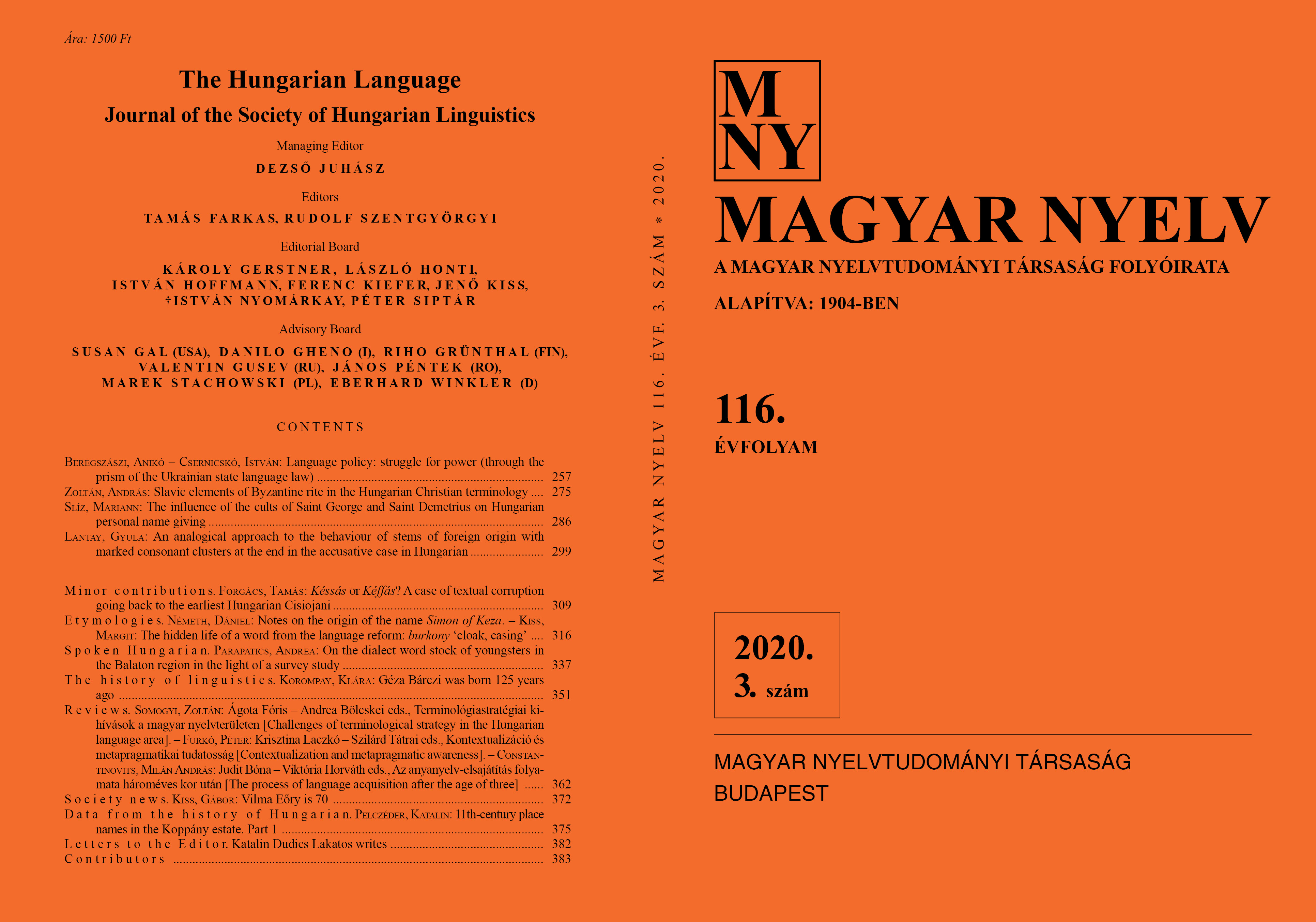An analogical approach to the behaviour of stems of foreign origin with marked consonant clusters at the end in the accusative case in Hungarian
DOI:
https://doi.org/10.18349/MagyarNyelv.2020.3.299Keywords:
analogical grammar, gangs, accusative case, extrasillabicity, linking vowel, consonant clusterAbstract
This paper examines nouns of foreign origin with strongly marked consonant clusters at the end and how they behave when Hungarian native speakers inflect them for the accusative case. Unlike other Hungarian nouns (or what speakers reckon as Hungarian nouns), a significant part of Hungarian native speakers add the accusative case marker to these nouns without a linking vowel (e.g. taps > tapsot [tɒpʃ] > [tɒpʃot] ‘applause, nom. > acc.’ but Hanks > Hankst [hɛŋks] > [hɛŋkst]) which is highly unexpected. The investigation took place within the model of analogical grammar. The gang of monomorphemic Hungarian nouns that end in the consonant clusters [ks], [ns], or [ps] facilitates the appearance of a linking vowel in recent words of foreign origin with three consonants at the end when Hungarian speakers inflect them for the accusative case. When, on the other hand, there is no linking vowel at the end of the nouns of foreign origin in the accusative, the gang that affects them comprises those Hungarian monomorphemic nouns which have non-branching codas with an [s] in them. There are three gangs that affect the nouns of foreign origin with two consonants at the end. The first one is where the branching coda’s first consonant is [r] or [l] and a linking vowel is required. The second and third gangs comprise Hungarian monomorphemic nouns that have non-branching codas with an [l] (in the case of the second gang) or with an [n] (in the case of the third gang). These two gangs allow their members to exhibit the absence of a linking vowel when they are in the accusative case.
Downloads
Published
Issue
Section
License
Copyright (c) 2024 Gyula Lantay

This work is licensed under a Creative Commons Attribution-NonCommercial-NoDerivatives 4.0 International License.
Magyar Nyelv is a Diamond Open Access periodical. Documents can be freely downloaded and duplicated in an electronic format, and can be used unchanged and with due reference to the original source. Such use must not serve commercial purposes. In the case of any form of dissemination and use, Hungarian Copyright Act LXXVI/1999 and related laws are to be observed. The electronic version of the journal is subject to the regulations of CC BY-NC-ND (Creative Commons – Attribution-NonCommercial-NoDerivatives).
The journal permits its authors, at no cost and without any temporal limitation, to make pre-print copies of their manuscripts publicly available via email or in their own homepage or that of their institution, or in either closed or free-for-all repositories of their institutions/universities, or other non-profit websites, in the form accepted by the journal editor for publication and even containing amendments on the basis of reviewers’ comments. When the authors publicize their papers in this manner, they have to warn their readers that the manuscript at hand is not the final published version of the work. Once the paper has been published in a printed or online form, the authors are allowed (and advised) to use that (post-print) version for the above purposes. In that case, they have to indicate the exact location and other data of the journal publication. The authors retain the copyright of their papers; however, in the case of an occasional secondary publication, the bibliographical data of the first publication have to be included.



